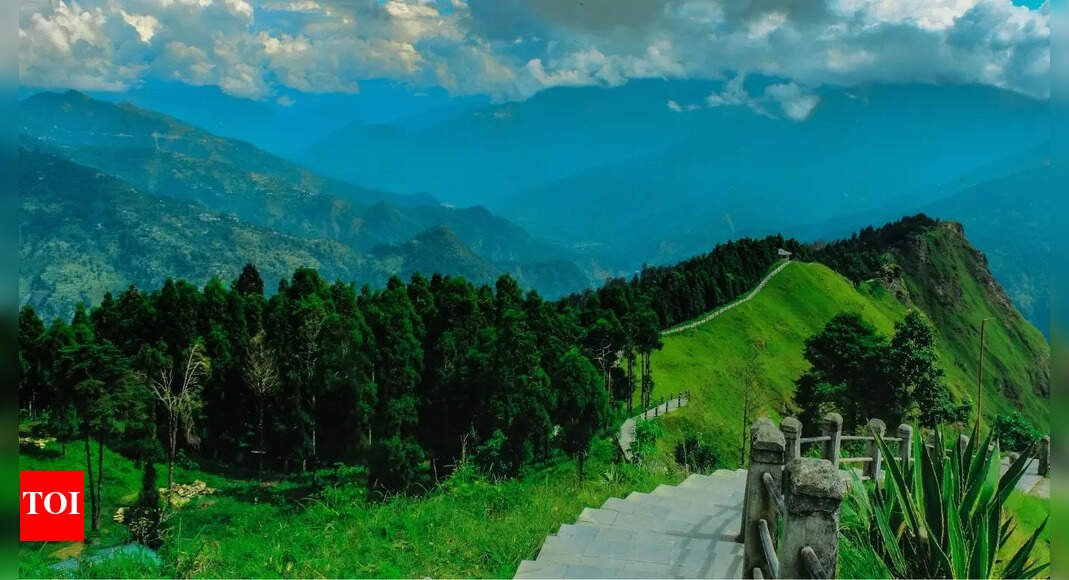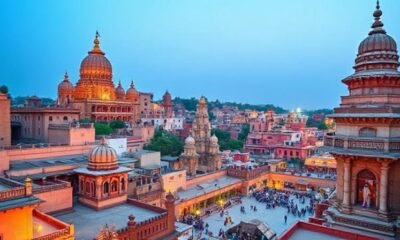Travel Guides & Articles
Skal India National Congress 2025: South Mumbai Set to Redefine India’s Tourism Leadership

Friday, August 22, 2025
The countdown has begun for the Skal India National Congress 2025, and under the leadership of Dr Mukesh Batra, President of Skal International South Mumbai, the event promises to be a landmark in India’s tourism narrative. This is not just another industry congregation; it is an ambitious platform designed to create long-term strategic value for India’s global tourism network. By uniting global Skal leaders, policymakers, entrepreneurs, and innovators, the Congress aims to position India as a top-tier destination that blends tradition with innovation while reimagining tourism for a fast-changing world.
At the heart of this Congress is the theme “Tourism in an Evolving World.” It reflects the urgent need for tourism to respond to today’s challenges: climate change, digital transformation, shifting traveller preferences, and new expectations for sustainability. South Mumbai, now recognised as one of the fastest-growing Skal clubs both in numbers and percentage, stands as a symbol of this transformation. Its success stems from inclusive strategies that welcomed younger professionals, women leaders, and voices from emerging segments like medical tourism, wellness travel, and experiential journeys. This momentum is now being channelled into a Congress that is set to attract global attention.
What makes Skal India National Congress 2025 distinctive is its multidimensional approach. It is not only about networking but also about shaping policy frameworks, encouraging investment, and driving meaningful dialogues. Destinations like Kashmir will take centre stage, serving as powerful case studies of resilience, peace, and renewal. By shining the spotlight on regions that are reclaiming their place on the global map, the Congress underscores how partnerships, policies, and people-driven initiatives can transform challenges into opportunities.
Another defining aspect of the Congress is its focus on synergy between tradition and innovation. From showcasing Ayurveda as wellness tourism 2.0 to exploring AI-driven travel solutions and smart infrastructure, the event will bridge India’s ancient cultural wealth with modern advancements. This deliberate fusion reinforces India’s dual identity – a civilisation rooted in heritage yet boldly future-ready.
The Congress also arrives at a moment when India has achieved a milestone of $36 billion in international visitor spending. With this achievement comes the responsibility to ensure that tourism growth is ethical, inclusive, and sustainable. By engaging communities, collaborating with NGOs, and emphasising eco-tourism, heritage preservation, and livelihood creation, Skal South Mumbai is determined to show how tourism can be both profitable and purposeful.
As anticipation builds, the Skal India National Congress 2025 is shaping up to be more than an event. It is a statement of intent. It is India telling the world that its tourism future will not just compete globally but inspire globally.
In an exclusive conversation with Travel and Tour World, Dr Mukesh Batra, President of SKAL International South Mumbai, shares his vision for the Skal India National Congress 2025. Set to be hosted in South Mumbai, this landmark event goes beyond ceremonial networking to create a transformative platform for collaboration, innovation, and sustainable growth in global tourism. Dr Batra outlines how inclusivity, cross-border partnerships, and the synergy of tradition with innovation will shape the Congress, positioning India as a future-ready tourism hub and a key player in the evolving global travel landscape.
1. Under your leadership, how is this upcoming event by Skal International South Mumbai expected to create strategic value for India’s global tourism network? What outcomes or collaborations are anticipated that will benefit key stakeholders across the travel and hospitality ecosystem?
Under my leadership, Skal India National Congress 2025 aims to be more than a ceremonial gathering; it is a strategic platform to forge global partnerships, promote cross-border tourism, and position India as a top-tier, experience-driven destination. By bringing together global Skal leaders, policymakers, influencers, and tourism stakeholders, we are creating space for collaborative innovation. The Congress will focus on actionable dialogues around investment, sustainability, digital transformation, and new-age travel trends. For stakeholders, this means direct access to global best practices, potential joint ventures, and business opportunities that align with India’s evolving tourism narrative.
2. Skal South Mumbai was recently recognized for both “Highest Growth in Numbers” and “Highest Percentage Growth.” What specific initiatives or leadership strategies led to this remarkable expansion and member engagement? As President of the Club, what is your overarching vision for the National Congress 2025?
These awards are the outcome of a deliberate focus on inclusivity, innovation, and value-driven engagement. We broadened membership beyond traditional verticals, welcoming younger professionals, women leaders, and entrepreneurs from allied sectors such as wellness tourism, medical tourism, and experiential travel. Our events go beyond networking mixers – they are intentional forums enriched with meaningful content, cultural depth, and tangible takeaways. My vision for the Congress is to establish it as a landmark event on the global SKAL calendar – one that showcases India’s diversity, thought leadership, and hospitality, while setting a new benchmark for collaboration between Indian and international tourism stakeholders.
3. With the theme “Tourism in an Evolving World,” what major insights or actionable frameworks do you expect will emerge from the Skal India National Congress 2025? How will these shape the future of Indian tourism – particularly in dynamic regions like Kashmir that are undergoing a tourism resurgence?
“Tourism in an Evolving World” is more than just a theme – it’s a call to reimagine tourism in the context of climate change, digital disruption, and evolving traveler mindsets. A key focus will be on regenerative tourism, where tourism contributes to healing rather than harming. We’ll also explore how India can respond to the expectations of new-age travelers who value authenticity, purpose, and sustainability.
Kashmir will be spotlighted as a case study: a region of immense natural beauty and emotional significance, now reclaiming its place on the global tourism map. We will delve into how peace, policy, and partnerships can transform such destinations into resilient and inspiring tourism success stories.
4. India’s international visitor spending has reached $36 billion—a remarkable milestone. How is Skal International South Mumbai leveraging this momentum through the Congress, especially in terms of promoting sustainable tourism, community inclusion, and ethical growth?
This milestone reflects both opportunity and responsibility. At Skal South Mumbai, we see our role as a catalyst for ethical growth – not just economic growth. The Congress will highlight sustainable travel models, including eco-tourism, heritage preservation, and local livelihood creation. We are collaborating with NGOs, community leaders, and policy makers to ensure tourism is inclusive benefiting not just urban centers but also rural, tribal, and culturally rich pockets of India. Ethical travel, responsible tourism, and human-centric hospitality will form the core pillars of our discussions and action plans.
5. One of the themes of this Congress is the synergy of tradition and innovation. How will Skal South Mumbai’s upcoming event embody this blend to position India as a distinctive and future-ready destination for global tourists and investors?
India thrives at the crossroads of ancient civilization and cutting-edge innovation. The Congress will mirror this dual identity – offering immersive experiences of our heritage (music, cuisine, craft, and culture) alongside thought-provoking sessions on AI in travel, smart tourism infrastructure, and digital storytelling.
Whether it’s promoting Ayurveda as wellness tourism 2.0 or showcasing how heritage hotels are going green through tech integration, we aim to present India as a land where tradition enhances innovation. By doing so, we reinforce India’s position not just as a destination, but as an idea – timeless yet forward-looking.
Travel Guides & Articles
India’s TBO to acquire Classic Vacations

India based travel distribution platform TBO has agreed to acquire Classic Vacations from Phoenix-based investment firm, The Najafi Companies.
The transaction value is estimated at up to $125 million.
The acquisition brings together TBO’s technology platform and worldwide inventory with Classic Vacations network of luxury travel advisors and suppliers.
Classic Vacations delivered revenue of $111 million and an operating EBITDA of $11.2 million in the fiscal year ended December 31, 2024.
“We’re thrilled to bring Classic Vacations into the TBO family – the company’s longstanding delivery of outstanding services has earned the trust of its more than 10,000 travel advisors in the U.S,” said Gaurav Bhatnagar, TBO’s co-founder and joint managing director.
“Classic Vacations is led by a strong team of experts and will continue as an independent brand.”
“As we start working on integrating Classic Vacations with TBO, we will remain open to similar strategic alliances going forward,” added Ankush Nijhawan, co-founder and co-managing director.
Melissa Krueger, CEO of Classic Vacations, added: “Together, we’re strengthening Classic Vacations’ position as the premier luxury partner in the market while extending our reach onto the global stage.”
Classic Vacations was bought by The Najafi Companies in 2021 from Expedia Group.
Classic Vacations has a large network of high-value travel advisors and deep ties with major American consortia.
It delivers premium service across hotels, air, experiences, car rentals, and travel protection, specializing in bespoke luxury itineraries.
Related News Stories: Partner News – TravelMole
Travel Guides & Articles
Govt allows select minorities to stay in India without passport

The Union Home Ministry on Monday, September 1, issued an order announcing that the government now exempts minority communities, namely, Hindu, Sikh, Buddhist, Jain, Parsi and Christian fleeing religious persecution from Afghanistan, Bangladesh, and Pakistan, who entered the country by December 31, 2024, without requiring valid passports or travel documents.
“A person belonging to a minority community in Afghanistan, Bangladesh and Pakistan, namely, Hindu, Sikh, Buddhist, Jain, Parsi and Christian, who was compelled to seek shelter in India due to religious persecution or fear of religious persecution and entered into India on or before the 31st December, 2024,” read the order from the home ministry.
Interestingly, the order did not name Muslims. This is in line with the BJP-led government’s Citizenship Amendment Act (CAA) that was passed in 2019 to facilitate this. It had le to severe protests from Muslims and other citizens who said the law is discriminatory in nature and that it can also be misused to disenfranchise Muslims in the country.
In fact, over the last few months the central government and BJP-led state governments have been targeting Indian Muslims from West Bengal who were being picked up on false allegations of being Bangladeshi citizens. Several prominent activists including Umar Khalid and Sharjeel Imam are currently in jail having spent nearly five years in prison on charges of inciting riots in Delhi amid the anti-CAA protests.
It was issued as part of a series of directives made public by the Union Home Ministry, under the newly enacted Immigration and Foreigners Act, 2025, which came into effect on Monday, September 1.
The Immigration and Foreigners Bill, 2025, aims to grant the Union government the power to control the entry and exit of individuals into and from India by regulations that outline requirements for travel documents, such as passports, and govern various aspects of foreign nationals’ stay, including visa rules, registration procedures, and other related matters.
Previously, the Citizenship Amendment Act (CAA), which was enforced last year, extended the eligibility for citizenship only to non-Muslim minorities from Afghanistan, Bangladesh, and Pakistan who entered India on or before December 31, 2014.
While the recent directive allows certain individuals to stay in India without documentation if they arrived by December 31, 2024, it doesn’t guarantee citizenship.
In contrast, the 2019 Citizenship Amendment Act offers a path to citizenship for persecuted non-Muslim minorities from Pakistan, Afghanistan, and Bangladesh who entered India before December 2014.
The CAA’s exclusion of Muslims sparked widespread protests and concerns about discrimination, secularism, and potential disenfranchisement.
Travel Guides & Articles
Greenest destinations in India for eco-conscious travellers |

India is a haven for eco-conscious travelers seeking sustainable travel experiences. From lush rainforests to pristine Himalayan valleys, these are the places where natural beauty and responsible tourism go hand in hand. Here is a list of India’s greenest escapes, ideal for travelers who wish to explore and make the most of the outdoors while minimizing their environmental impact.
Mawlynnong, Meghalaya
Known as Asia’s Cleanest Village, Mawlynnong in Meghalaya is a model of sustainable living. Look around you and you will find bamboo dustbins. People do not litter here and they expect the tourists also to respect the village’s ways and not litter. Plastic is banned here. Take out time to explore the living root bridges, and interact with the local community. There are eco-lodges and homestays where visitors can stay, these stays offer authentic experiences.
Thenmala, Kerala
This is India’s first planned eco-tourism destination, Thenmala in Kerala’s Western Ghats offers a sustainable escape amidst evergreen forests. Also known as “Honey Hill,” it features attractions like the Thenmala Dam, Butterfly Safari Park, and Shenduruney Wildlife Sanctuary. For those interested, there are activities like boating, trekking, and rock climbing.
Sikkim
The entire state of Sikkim is a beacon of eco-tourism. Sikkim is recognized for its organic farming and conservation efforts. No wonder, it is also India’s first fully organic state. Sikkim is home to the Khangchendzonga National Park, a UNESCO World Heritage Site, which also boasts diverse flora and fauna, including red pandas and snow leopards. There is no dearth of eco-friendly guesthouses, responsible trekking opportunities, and cultural immersion with Lepcha and Bhutia communities. And last but not least, Sikkim is very clean, thanks to the eco-conscious communities.
Munnar, Kerala
Munnar in Kerala’s Western Ghats, is known for its tea plantations, lush valleys, and biodiversity. It is where you will find the rare Neelakurinji flower and species like the Nilgiri Tahr. Munnar is a great place for those seeking romantic getaways, but it is equally perfect for those seeking adventure activities like trekking and wildlife watching. Eco-resorts and sustainable practices, like waste management and local sourcing, ensure a low environmental footprint.
Spiti Valley, Himachal Pradesh
Monsoon may not be the right time to visit Spiti Valley, but come drier months, Spiti is one of the best in the country. This cold desert in the Himalayas, balances tourism with ecological preservation. Solar-powered homestays and community-based tourism initiatives support local livelihoods while protecting the fragile ecosystem. Travelers can explore ancient monasteries, trek through rugged terrains, and engage with sustainable practices, making Spiti a unique eco-destination. Here, it’s all about green energy and sustainable practices, because the greenery that comes with nature is a bit rare here, thanks to it being a cold desert.
-

 Business5 days ago
Business5 days agoThe Guardian view on Trump and the Fed: independence is no substitute for accountability | Editorial
-
Tools & Platforms3 weeks ago
Building Trust in Military AI Starts with Opening the Black Box – War on the Rocks
-

 Ethics & Policy1 month ago
Ethics & Policy1 month agoSDAIA Supports Saudi Arabia’s Leadership in Shaping Global AI Ethics, Policy, and Research – وكالة الأنباء السعودية
-

 Events & Conferences4 months ago
Events & Conferences4 months agoJourney to 1000 models: Scaling Instagram’s recommendation system
-

 Jobs & Careers2 months ago
Jobs & Careers2 months agoMumbai-based Perplexity Alternative Has 60k+ Users Without Funding
-

 Education2 months ago
Education2 months agoVEX Robotics launches AI-powered classroom robotics system
-

 Funding & Business2 months ago
Funding & Business2 months agoKayak and Expedia race to build AI travel agents that turn social posts into itineraries
-

 Podcasts & Talks2 months ago
Podcasts & Talks2 months agoHappy 4th of July! 🎆 Made with Veo 3 in Gemini
-

 Podcasts & Talks2 months ago
Podcasts & Talks2 months agoOpenAI 🤝 @teamganassi
-

 Education2 months ago
Education2 months agoAERDF highlights the latest PreK-12 discoveries and inventions





















